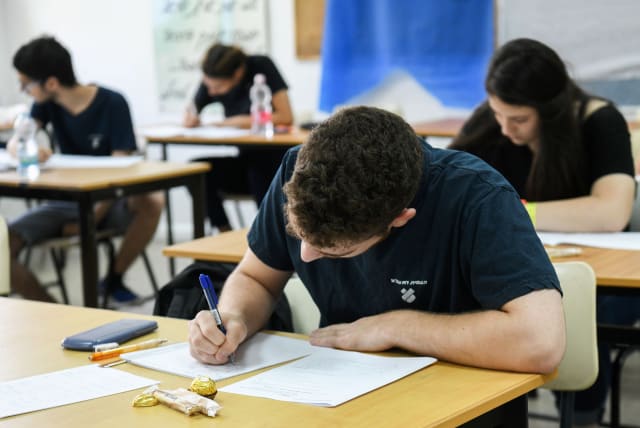Why would Israel's new gov't axe matriculation exam reforms? - opinion

In schools in which democracy, critical thinking and presenting both sides of the argument are fundamental to the way we teach, children must be exposed to the conundrums that society faces.
Last Thursday afternoon, after less than a week as the education minister, an area in which he has no formal professional experience, Yoav Kisch canceled the reform in matriculation testing. Just like that.
One could argue whether it was a necessary move to stop the reform, or simply part of the coalition agreement. But with no apparent meetings with senior education advisers, no discussions with school inspectors, and no visits to schools to talk to principals or teachers, not only was he brutal in his dismissal of the plans and the processes which had already been implemented – not to mention the time and of money expended – but it was also another blow to the already battered professional status of teachers in Israel. If teaching is still a profession, such moves cannot be allowed.
It has been plainly obvious to anyone in education (and probably most who aren’t) that the way in which high school students are evaluated has needed a change for the last twenty or even thirty years. Today, we are still testing children in the same way that they were tested seventy years ago, when we know that the world today is as different a place as anyone could imagine and the skill sets needed have dramatically changed. Yes, the Bagrut needs changing for this and for many other reasons.
Yet education is about long processes. Changes on this scale take time and they can be painful. They require hard work, a change in approach, the ability and desire to be flexible and to admit mistakes, and the will to change direction if need be. Yes, there are questions over the reform and how it was being enacted, but what is certain is that change is needed.
For the last six to eight months, thousands of principals and teachers have been working toward this change in order to adapt the bagrut (matriculation) evaluation to the 21st century. Yet overnight, without warning, Kisch threw out the reform and returned us to the old ways of testing.
AS ONE of those people on the ground, who has been working and planning for these changes, it is a soul-destroying directive. Yet I ask myself why he has done this and how has he done this with such little research into the subject? To me, the answer is frighteningly simple.
The new government, in its coalition agreement with Degel Hatorah, agreed to cancel the reform. The irony cannot be lost on anyone. Degel Hatorah is an ultra-religious party which refuses to allow the children of their voters the opportunity to take the matriculation exams.
So why would this be part of their coalition demands?
I cannot be certain of the reasons but can suggest, that they saw that in the new matriculation program, the directive to reduce one hour of both Tanach and history per week (in 10-11 grades) and they jumped to the conclusion that this would mean less Judaism in the classroom of secular schools. This thinking is truly ridiculous. If they believe that an extra hour of these subjects will keep secular children more connected to Judaism, then I politely suggest that they are more disconnected from secular society than even they would wish to be.
Yet the matriculation reform stretched across both secular and religious schools; it was for the good of all children. Its aim was to improve children’s skills so that they would be better prepared for the workforce and the capabilities needed in the 21st century.
In fact, Miri Shlissel, the recently resigned head of pedagogy, is herself religious. Can anyone seriously believe that she would want to harm the Judaism of this country? The decision taken last week is almost impossible to rationalize.
However, there is another side to this discussion: that this is democracy in its purest form. The people voted, the government formed and they have a mandate from the people to enact their laws. This can be very hard to accept. Yet there is no getting away from this argument. In schools in which democracy, critical thinking and presenting both sides of the argument are fundamental to the way we teach, children must be exposed to the conundrums that society faces on a daily basis.
Although the much-needed matriculation reforms have been postponed, the aforementioned values on which we base the education of our children must continue to be woven within the daily fabric of our education system.
The writer is the principal of Studio Ankori – a school for creative thinking and entrepreneurship. Studio Ankori is part of the Ankori Educational Group.
Jerusalem Post Store
`; document.getElementById("linkPremium").innerHTML = cont; var divWithLink = document.getElementById("premium-link"); if (divWithLink !== null && divWithLink !== 'undefined') { divWithLink.style.border = "solid 1px #cb0f3e"; divWithLink.style.textAlign = "center"; divWithLink.style.marginBottom = "15px"; divWithLink.style.marginTop = "15px"; divWithLink.style.width = "100%"; divWithLink.style.backgroundColor = "#122952"; divWithLink.style.color = "#ffffff"; divWithLink.style.lineHeight = "1.5"; } } (function (v, i) { });

